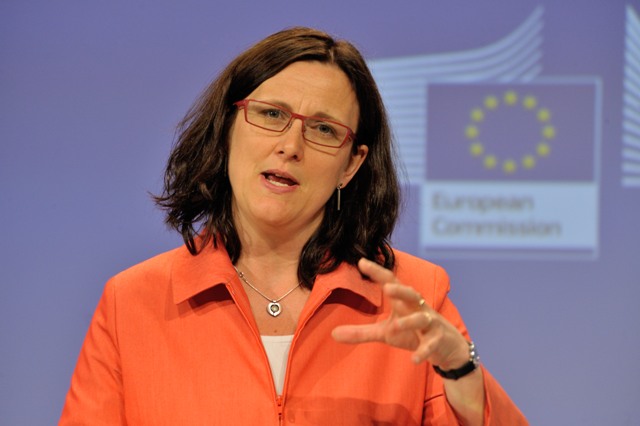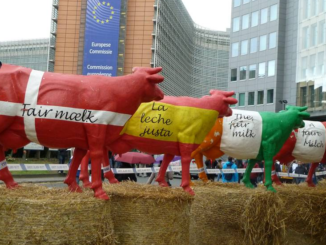
UPDATED 17/09/2015 at 12.42 CET (with US Chamber of Commerce information in final paragraph)
Critics have rounded on yet another fudge by the EU Commission on the highly controversial ISDS – Investor State Dispute Settlement – element of TTIP – the Transatlantic Trade and Investment Partnership.
Today at midday, the Commission announced “a new Investment Court System which would replace the ISDS mechanism in all on-going and future EU investment negotiations.”
It “has approved its proposal for a new and transparent system for resolving disputes between investors and states – the Investment Court System. This new system would replace the existing investor-to-state dispute settlement (ISDS) mechanism in all ongoing and future EU investment negotiations, including the EU-US talks on a Transatlantic Trade and Investment Partnership (TTIP).”
The Commission’s First Vice-President Frans Timmermans said “With our proposals for a new Investment Court System, we are breaking new ground. The new Investment Court System will be composed of fully qualified judges, proceedings will be transparent, and cases will be decided on the basis of clear rules. With this new system, we protect the governments’ right to regulate, and ensure that investment disputes will be adjudicated in full accordance with the rule of law“
Made available today by the Commission is a summary here a reader’s guide here and the text proposal itself here.
This follows “substantial input” from numerous sources, the Commission claims, code for enormous pressure from civil society, which is the main impetus for these constant attempts to fudge the ISDS issue.
Critics have again rounded on this supposedly different version of ISDS.
Cécile Toubeau, senior trade officer at Transport and Environment exposed the facade: “The EU cannot hide behind a name change when the flaws of the Investment Court System remain the same. Citizens will continue to unfairly shoulder private risks taken by foreign investors, while lawmakers will be deterred from regulating in the public interest.”
The T&E also added that:
“Investors will also be allowed to select either a national court or the Investment Court System, according to the European Commission’s proposal, thereby enabling them to choose the route that will give them the best financial outcome. Big business will not be required to exhaust all national legal remedies, as EU citizens must do before they can go to the European Court of Justice.”
Importantly, they also added that “today’s announcement lacked detail on a new so-called ‘right to regulate’, while there are no limits on the amount that can be awarded to investors.”
In addition, Friends of the Earth Europe point out that “Trade Commissioner Malmström confirmed today that the new proposal will not apply to the almost finalised EU-Canada agreement. This allows US companies with subsidiaries in Canada to sue European member states based on the old model.”
As Global Justice Now emphasise, this proves the need to halt the as yet unsigned CETA.
And already this sort of procedure has been used by Corporations, notably Philip Morris in the ongoing case where the corporation is suing the Australian government over plain packaging of tobacco products through a subsidiary in Singapore.
Natacha Cingotti, trade campaigner at Friends of the Earth Europe added “The inclusion of investor-state arbitration – albeit under a different name – in an EU-US agreement is not necessary. It would expand its scope to an unprecedented level to all trade between the EU and the US, while now less than 10% is covered by ISDS. As long as companies can sue governments if they act in the public interest, the ability of governments to regulate is undermined. It should be resisted at all costs.”
Indeed the case for expanding ISDS type arrangements is further weakened by the revelation today by Commissioner Malmström herself that “no direct relationship” can be seen between the controversial arbitration tribunals in the draft EU-US trade agreement and increased investment.
Laurens Ankersmit EU Trade & Environment Lawyer with Client Earth also revealed that Malmström, in today’s press conference was “not aware of the option to to consult the European Court of Justice before an agreement enters into force.” In fact, “such a procedure clearly exists and has been used by the Commission at least 14 times in the past. Ankersmit states, citing Article 218 (11) of the TFEU :
“11. A Member State, the European Parliament, the Council or the Commission may obtain the opinion of the Court of Justice as to whether an agreement envisaged is compatible with the Treaties. Where the opinion of the Court is adverse, the agreement envisaged may not enter into force unless it is amended or the Treaties are revised.”
(See below, taken directly from the text itself)

Indeed a Court of Justice opinion on the trade deal with Singapore has been requested, as the European Commission reveled in March of this year.
With a round of actions upcoming in and around 10th October all over Europe the fight against this dodgy trade deal and charter of rights for corporations seems set to intensify.
UPDATED 17/09/2015 at 12.42 CET
Its not just civil society organisations that have serious reservations with this new court, as proposed by the European Commission. The U.S. Chamber of Commerce is, it appears, livid at the very idea of an Investment Court System.
U.S. Chamber of Commerce Vice President for European Affairs Marjorie Chorlins issued the following statement on the announcement by the European Commission, on their intent to adopt the Investment Court System, a new approach to the investor-state dispute settlement system:
”While we recognize the EU has a political problem relating to future investment treaties, the U.S. business community cannot in any way endorse todays EU proposal as a model for the Transatlantic Trade and Investment Partnership (TTIP). The recent European debate around investment treaties the obligations governments accept in them and the methods they provide for dispute settlement is not grounded in the facts, and the distortions in this debate cannot be allowed to trump sound policy.
If the EU still regards the TTIP as a serious objective, todays proposal is deeply flawed. Tough negotiations lie ahead, and the reforms the United States has undertaken in recent years in its own investment agreements represent a far superior starting point for these important deliberations.”
All ARC2020 news on TTIP
ARC2020 briefing notes on TTIP





